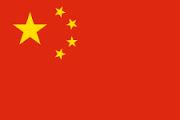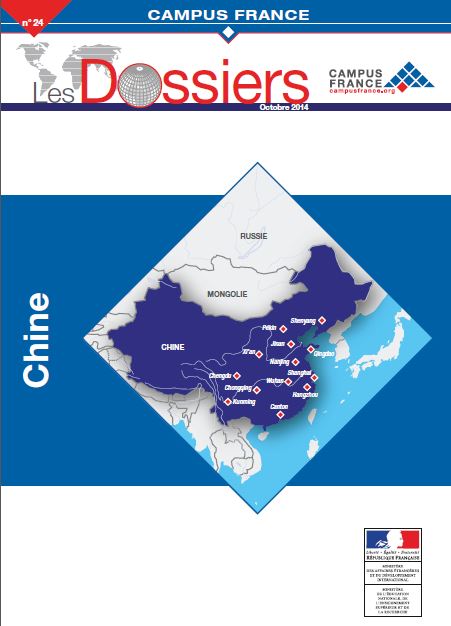China: Future "laboratory of the world"?
Clarisse Faria-Fortecoëf

Context and prospects of French students' mobility in China and the Franco-Chinese cooperation in academic, research and innovation fields.
 Some data on Chinese Higher Education
Some data on Chinese Higher EducationWith a consequent increase in enrollment, which rose from 7,000,000 in 2000 to 34,600,000 in 2013 (figure which includes students enrolled in initial training, continuing and distance education, levels Benke and Zhuanke (undergraduate and postgraduate) to a PhD level in a public or private higher education institution), China has in 2013, 2788 public Higher Education institutions.
Nine leading research universities in China are currently part of the C9 League founded in 2009 by the Chinese government :
Internationalization and student mobility
Promoting since 2003, the internationalization of its universities in particular by supporting the mobility of Chinese students (they were less than 20,000 in a foreign country in 1999 and nearly 700 000 in 2012), China aims to become the first destination for international students by 2020, and therefore fosters the incoming mobility. According to figures from the Ministry of Education of the People's Republic of China (MOE), 141,087 foreign students were enrolled in a Chinese Higher Education institution and 328,330 in 2012. France is in 11th position with 8,386 French students in China, they were 3,105 in 2005.
In terms of financial support for incoming mobility, China has provided via the China Scholarship Council (CSC) - one of the government agencies and a nonprofit institution established in 1996, promoting the internationalization -, a scholarship to 7,218 foreign students in 2005 and to 28,768 in 2012. The target is to reach in 2015, 50,000 scholarships.
Franco-Chinese academic cooperation
More and more foreign higher education institutions are setting up in China. In the case of France, there are currently seven Franco-Chinese institutes: five in the field of engineering sciences, one in the areas of engineering science and management and one in humanities and social field. Among the more recent: the engineering and management institute established by the CNAM and the Wuan University, IFCIM , opened on April 10, 2013.
The current trend of cooperation programs, double degrees or joint institutes is to adopt sustainable financial models based in particular on strengthening links with the business world.
There are also branch campuses, non-accredited by the MOE, which represent the main framework of the mobility of French students pursuing part of their studies in China, such as the EMLYON Business School in Shanghai.
Furthermore, the Embassy of France in China has for goal to increase the number of scholarship programs. Among these programmes, Cai Yuanpei which since 2010 supports in partnership with the CSC, the mobility of PhD students in international joint supervision of thesis, as well as the mobility of French and Chinese researchers (see our article on this program).
The cooperation in research and innovation fields
« From world's workshop, China aims to be the laboratory of the world » with a budget representing 1.8% of the annual GDP dedicated to overall expenses on R&D (1,000 billion RMB ( renminbi) or approximately 123 billion euros in 2012), the goal being to reach 2.5% in 2020.
The Ministry of Science and Technology (MOST) and the National Natural Science Foundation of China (NSFC) are particularly responsible of the research's monitoring.
There is also a strong involvement of companies in the field of R&D : 657 billion RMB (about 81 billion).
Furthermore, China is in second position for the number of scientific publications, about 10% of world publications. In terms of co-publications, 5% of them were signed with France in 2010 (29% with European researchers) mainly in chemistry, physics and medical research.
More than 2000 French researchers traveled to China for short-term assignments in 2012. France is a key figure of the Euro-Chinese cooperation with about forty joint laboratories and projets supported by the French National Research Agency (ANR).
Through the COOPOL Innovation programme (see our article on this program), a specific support is given to French SME of competitiveness clusters which want to develop, jointly with a public partner, research projects with Chinese partners.
The above data come mainly from the « DOSSIER pays CHINE » (only available in French), the 24th volume of the collection « Les dossiers Pays » of Campus France published in October 2014.
Nine leading research universities in China are currently part of the C9 League founded in 2009 by the Chinese government :
- Peking University and Tsinghua University (Beijing Municipality);
- Harbin Institute of Technology;
- University of Science and Technology in Hefei;
- Zhejiang University in Hangzhou;
- Fudan University and Shanghai Jiao Tong University;
- Nanjing University;
- Xi'an Jiaotong University.
Internationalization and student mobility
Promoting since 2003, the internationalization of its universities in particular by supporting the mobility of Chinese students (they were less than 20,000 in a foreign country in 1999 and nearly 700 000 in 2012), China aims to become the first destination for international students by 2020, and therefore fosters the incoming mobility. According to figures from the Ministry of Education of the People's Republic of China (MOE), 141,087 foreign students were enrolled in a Chinese Higher Education institution and 328,330 in 2012. France is in 11th position with 8,386 French students in China, they were 3,105 in 2005.
In terms of financial support for incoming mobility, China has provided via the China Scholarship Council (CSC) - one of the government agencies and a nonprofit institution established in 1996, promoting the internationalization -, a scholarship to 7,218 foreign students in 2005 and to 28,768 in 2012. The target is to reach in 2015, 50,000 scholarships.
Franco-Chinese academic cooperation
More and more foreign higher education institutions are setting up in China. In the case of France, there are currently seven Franco-Chinese institutes: five in the field of engineering sciences, one in the areas of engineering science and management and one in humanities and social field. Among the more recent: the engineering and management institute established by the CNAM and the Wuan University, IFCIM , opened on April 10, 2013.
The current trend of cooperation programs, double degrees or joint institutes is to adopt sustainable financial models based in particular on strengthening links with the business world.
There are also branch campuses, non-accredited by the MOE, which represent the main framework of the mobility of French students pursuing part of their studies in China, such as the EMLYON Business School in Shanghai.
Furthermore, the Embassy of France in China has for goal to increase the number of scholarship programs. Among these programmes, Cai Yuanpei which since 2010 supports in partnership with the CSC, the mobility of PhD students in international joint supervision of thesis, as well as the mobility of French and Chinese researchers (see our article on this program).
The cooperation in research and innovation fields
« From world's workshop, China aims to be the laboratory of the world » with a budget representing 1.8% of the annual GDP dedicated to overall expenses on R&D (1,000 billion RMB ( renminbi) or approximately 123 billion euros in 2012), the goal being to reach 2.5% in 2020.
The Ministry of Science and Technology (MOST) and the National Natural Science Foundation of China (NSFC) are particularly responsible of the research's monitoring.
There is also a strong involvement of companies in the field of R&D : 657 billion RMB (about 81 billion).
Furthermore, China is in second position for the number of scientific publications, about 10% of world publications. In terms of co-publications, 5% of them were signed with France in 2010 (29% with European researchers) mainly in chemistry, physics and medical research.
More than 2000 French researchers traveled to China for short-term assignments in 2012. France is a key figure of the Euro-Chinese cooperation with about forty joint laboratories and projets supported by the French National Research Agency (ANR).
Through the COOPOL Innovation programme (see our article on this program), a specific support is given to French SME of competitiveness clusters which want to develop, jointly with a public partner, research projects with Chinese partners.
The above data come mainly from the « DOSSIER pays CHINE » (only available in French), the 24th volume of the collection « Les dossiers Pays » of Campus France published in October 2014.
More information about ABG?
Get ABG’s monthly newsletters including news, job offers, grants & fellowships and a selection of relevant events…
Discover our members
 SUEZ
SUEZ  ADEME
ADEME  TotalEnergies
TotalEnergies  Servier
Servier  Aérocentre, Pôle d'excellence régional
Aérocentre, Pôle d'excellence régional  Groupe AFNOR - Association française de normalisation
Groupe AFNOR - Association française de normalisation  ASNR - Autorité de sûreté nucléaire et de radioprotection - Siège
ASNR - Autorité de sûreté nucléaire et de radioprotection - Siège  Nokia Bell Labs France
Nokia Bell Labs France  Généthon
Généthon  Nantes Université
Nantes Université  Laboratoire National de Métrologie et d'Essais - LNE
Laboratoire National de Métrologie et d'Essais - LNE  ONERA - The French Aerospace Lab
ONERA - The French Aerospace Lab  Tecknowmetrix
Tecknowmetrix  Medicen Paris Region
Medicen Paris Region  ANRT
ANRT  Institut Sup'biotech de Paris
Institut Sup'biotech de Paris  Ifremer
Ifremer

